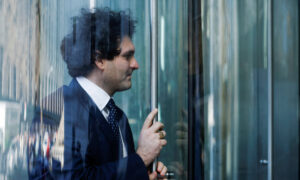FTX founder Sam Bankman-Fried devoted a bulk of his testimony in a Manhattan courtroom on Friday to addressing insubstantial, soft questions about his fashion choices, his hairstyle, his daily routines, his sports preferences, his office space, and his romantic life during his time as CEO of the doomed exchange. When his testimony did touch on the highly serious issues that prosecutors have raised since the trial began on Oct. 3, his statements tended to be vague and evasive. So much so that Judge Lewis Kaplan lashed out at the defendant for answering in such a discursive manner. Mr. Bankman-Fried painted his missteps as innocent ones on the part of someone who knew little about cryptocurrency. In discussions with The Epoch Times, legal experts described Mr. Bankman-Fried’s and the defense team’s conduct during this segment of the trial as, at bottom, a ploy aimed at avoiding the hard issues, currying favor with jurors, and convincing at least one of them—only one is needed for a hung jury—that he is not the greedy and ruthless high-tech con artist painted by his many accusers. Asked why he wore shorts and T-shirts in his Bahamas office and even to important business meetings with prospective investors, Mr. Bankman-Fried dismissed the question with a quip: “I found them comfortable.” Why didn’t he get his hair cut more often? “I was kind of busy and lazy and didn’t bother getting haircuts for long periods of time,” he said. Here, again, Mr. Bankman-Fried alluded to the demands of his intensive work life as a reason for not acting in accordance with certain traditional expectations of how one should behave. Why didn’t the romantic relationship endure? “She wanted more from it than I was able to give,” Mr. Bankman-Fried stated. In other words, he did not treat Ellison shabbily but simply had too much passion for the important work he was doing as head of FTX to commit to meeting the demands of a serious relationship. Not many of these questions posed to Mr. Bankman-Fried on Friday raise substantive legal issues, but that may have been precisely the point, some legal experts believe. Spending time listening to Mr. Bankman-Fried field softball questions and talk about his personal life and habits may help jurors see beyond the caricature presented in many media sources and come to know him as a person, perhaps even wish to spare him from a prison sentence potentially exceeding one hundred years. When it emerged that Bankman-Fried had decided to take the stand and speak on his behalf, many observers expressed surprise. The prosecution had built a formidable case and would gladly seize an opportunity to subject the fallen mogul to withering cross-examination over many hours. But taking the stand was no clumsy misstep, said Jeffrey Hooke, a senior lecturer at the Johns Hopkins Carey Business School, who has followed the trial with interest. “I don’t think it was a colossal mistake. He’s a great salesman. He convinced a lot of very knowledgeable people in Silicon Valley and elsewhere to supply him with money. I expect he thinks he’ll be able to inspire the same sense of wonderment with the jury,” Mr. Hooke told The Epoch Times. “It’s a risky strategy, but some of the prosecution witnesses were pretty convincing,” he added. After the damning testimony of Caroline Ellison, Gary Wang, and others during the trial’s opening weeks, things may look bleak for Mr. Bankman-Fried. He could face more than a hundred years in prison if convicted on the most serious charges of wire fraud and money laundering. Yet the jurors may not treat the words of Mr. Bankman-Fried’s former inner circle as gospel. They are no doubt aware that some of the crucial witnesses on the prosecution side cut deals with the government to save their own skins, said Mr. Hooke. “So, some jurors may take their testimony with a grain of salt. Bankman-Fried only needs one or two for a hung jury,” he said. Indeed, if the charm offensive that FTX’s founder undertook in his Friday testimony fosters doubt in only one juror’s mind about sending the defendant off to prison for decades and conceivably for the rest of his life, then Mr. Bankman-Fried will have won. And the trial is far from over. “The Bitcoin and cryptocurrency phenomenon is still like the Wild West; a lot of these internet people are a little eccentric, and I’m sure sometimes that helps. Look at Elon Musk,” Mr. Hooke said. Mr. Hooke also pointed to the example of Elizabeth Holmes, founder of the defunct medical technology startup Theranos. Until a series of articles in the Wall Street Journal, and then a bestselling book by reporter John Carreyrou, exposed the fraud at the core of Theranos and the ruthlessness and deception that marked its CEO, Ms. Holmes relied on a human touch. She appeared onstage alongside former President Bill Clinton and used considerable powers of persuasion and personal charm to lure high-profile investors, including a former U.S. Secretary of State, to pour billions into a venture utilizing questionable science and equally dubious bookkeeping. What with FTX in ruins and owing more than $3 billion to various creditors, Mr. Bankman-Fried’s situation today, of course, is not directly analogous to that of Ms. Holmes back in 2013. But as Friday’s testimony made clear, Mr. Bankman-Fried may yet hold out a very small hope of waging a charm offensive and forging a personal rapport with the 12 men and women in the courtroom who will decide his fate.



